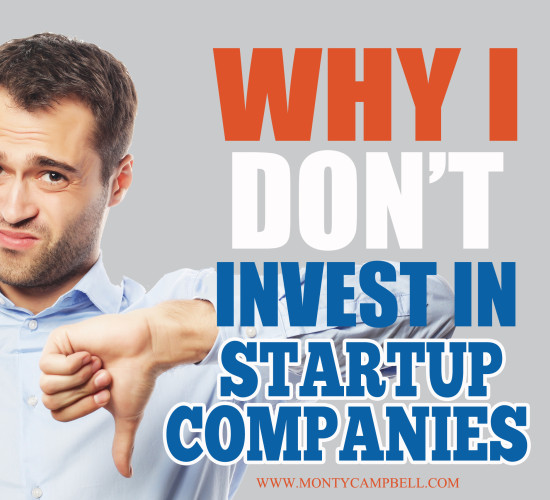It used to be the case that you needed to be an “accredited investor” before you would be allowed to invest in startups. An accredited investor was defined as someone having an annual income of $200,000 or a minimum net worth of $1 million.
All that has changed.
As part of the jobs act of 2012, the Securities and Exchange Commission will now let anyone invest at least $2,000 a year in a small company in exchange for a stake in the business. Companies are allowed to raise up to $1 million each year through this method.
The changes also allow small businesses to raise money without all the previously required regulatory hurdles. Among them is that most first-time issuers, or small companies seeking less than $500,000, don’t have to provide audited financial statements (They do, however, need to provide unaudited documents). Why anyone would want to invest in something without audited financial statements is beyond me.
But people do…
Look at me. I’m an angel investor!
It seems like these days everyone is talking about their angel investments. Bragging that they were an early investor in Facebook or Twitter. Heck, there are even “syndicates” now, where wannabe angel investors can play “follow-the-leader” and just invest in companies that the well known angel investors invest in. Such syndicates have raised hundreds of millions of dollars for startups.
Look, I get it. Angel investing is sexy business. Who doesn’t want to get in on the next cool thing like Uber or Pandora? Also, there’s a lot of stories in the press about investors hitting it big with angel investing, finding just the right company before it takes a rocket ride to the moon.
But that’s just it.
What about the ones that don’t? Or the ones that flame out and return to earth with a crashing thud? Those aren’t as glamorous as the rocket rides, so you don’t hear about them as much. But they do happen.
Take Theranos…
Theranos burst onto the startup scene in 2004 with claims to have invented a revolutionary blood-testing device that would use a few drops of blood obtained via finger-stick, rather than the vials full of blood of traditional methods.
Money poured in. Big hedge funds like Partner Fund Management invested millions to back the company’s operations as the startup took off.
All aboard for the rocket ride up
By December 2004, Theranos had more than $6 million from investors with an estimated company value of $30 million. The company had about $45 million total fundraising after startup funding in 2006. Theranos then raised an additional $45 million in 2010 and had an estimated value of $1 billion. By the summer of 2014, its founders had raised over $400 million from investors, valuing the company at $9 billion!
And then the proverbial sh– hit the fan.
Brace yourself for the rocket ride down
In October 2015, controversy surrounding the company’s blood testing process arose after a report in The Wall Street Journal raised concerns about the accuracy of its device. An independent U.S. government review by the Centers for Medicare and Medicaid Services (CMS) reported inaccurate testing results and multiple deficiencies in sample handling during a recent inspection.
On July 7, 2016, Theranos announced that it had received notice from the CMS regarding the revocation of its CLIA certificate. Sanctions included a prohibition of the owners and operators from owning or operating a lab for two years and a civil monetary penalty.
On October 5, 2016, Theranos announced that it would close its laboratory operations, shutter its wellness centers and lay off around 40 percent of its work force, while henceforth focusing on an initiative to create miniature medical testing machines.
And just this week, Partner Fund Management filed suit against the company in order to get its nearly $100 million investment back, claiming that they were fraudulently induced to invest in the company.
And here are a couple more examples…
Social networking app startup Secret raised $35 million from such prestigious groups as Google Ventures and Kleiner Perkins Caufield & Byers. But less than a year and a half after launching with that big supply of funds, the company halted operations.
And then there’s the case of Zirtual. Virtual-assistant company Zirtual surprised customers and all of its 400 employees when it announced it was “pausing all operations.” Founded in 2011, the company connected executives with remote assistants over the Internet to help with tasks like scheduling and making travel arrangements. Investors included people like Zappos CEO Tony Hsieh who had invested a total of $5.5 million in the company.
Startup investing doesn’t sound so sexy now does it?
I get asked often to invest in startups. Once every month or so, I’m contacted to see if I want to get in on the ground floor for some startup tech or drug company. I always say no. Here’s why you should as well:
1. There’s no track record. In many of these types of investment, there little-to-no evidence that they’re actually making money or will make it in the future. Yes, they have a cool website, a nifty mission statement and logo, but have they sold anything yet? Have they run a successful business before? Have they launched a startup before? I know stodgy old companies like Proctor and Gamble, Kraft and Wrigley’s are boring, but guess what? They’ve been around. You can look at their history. You can go touch, feel and buy their products. You can look-up their earnings and dividend history. The point here, is that you want some type of evidence that this is not a science project before you invest your hard-earned dollars. There’s not a lot of evidence with startups. Just like you wouldn’t marry someone without knowing their history, so you shouldn’t marry your dollars to an unknown business.
2. Given #1, it’s virtually impossible to value the business with any high degree of confidence. If you can’t assess a value to a business, how on earth can you know if you’re getting a good deal for your money? Is a $1 million dollar investment a raging bargain or are you getting taken to the cleaners? Ongoing businesses have years of balance sheets, income and cash flow statements that allow you to come to some approximation of the business’s true worth. Then, and only then, can you relate your investment to that worth to see if you’re getting a good deal or not. Otherwise, it’s just blind optimism. You’re putting your money into the slot machine and hoping that you get lucky. That’s not investing my friends, it’s speculation.
3. There’s no market. With stocks or bonds, there’s an exchange where investors can buy and sell these investments. In other words, there’s liquidity. I’m oversimplifying things here but if you no longer want to be invested in a public company, you just enter your sell order and sell it. Not so with your startup investment funds. They’re typically tied up for long periods of time with iron clad contracts. So, if you find out that the cool phone app startup is really just a dud, you’re hosed. Just ask Partner Fund Management. With no market to liquidate their position, they are left only to file suit and hope that a sympathetic jury rules in their favor a few years from now when the case is heard. How much do you think there investment will be worth then? Exactly.
4. There’s no trust capital. One of the unique characteristics of startup companies seeking funds is that they are secretive. And rightfully so. They are worried that someone will steal their idea. But that same need for secrecy keeps you as an investor in the dark. Darkness is not good my friend when it comes to investing. You want the full light of day to be shown on anything and everything about the company you are looking to invest in. Vanity Fair reported that Theranos took initial funding only on the condition that the company would not have to divulge to investors how the technology actually worked. Say what? Look, trust is earned my friend and as Ronald Reagan used to say – you should trust, but you should also verify. If someone approaches you with an investment opportunity and won’t allow you to inspect it for soundness, run, don’t walk away from it. As cool as secrets sound, a lot can be hidden under the auspices of “I need to keep our methods a secret”. As E.W. Howe said, “The man who can keep a secret may be wise, but he is not half as wise as the man with no secrets to keep.” Remember, every deception requires a secret.
When making investments, you want to make them for the long term. To do that, requires trust and confidence in what you see before you. The only way to get trust and confidence is to have transparency and a history of data that you can inspect and evaluate. Otherwise, you’re just hoping that everything will turn out good, with no real evidence that it might. That’s just gambling my friends, and here’s what I’ve had to say about that.
If you lose your money, they won’t send it back
Also, following some known angel investor blindly via a syndicate cannot save you from making bad investments –– it only ensures that you will lose your money along with them. Just because you respect an investor or think a syndicate has a lot of promise doesn’t mean that you’re not going to lose your shirt. And remember, if you lose your money they’re not going to send it back to you.
If you’re still not convinced, then ponder this – 90% of all startups fail. CB Insights parsed over a hundred post-mortem essays by startup founders to pinpoint the reasons they believe their company failed. The company crunched the numbers to reveal the number-one reason for failure. Want to take a guess as to what is was? Here’s the answer:
There was a lack of a market need for their product.
Gulp. Shouldn’t that be self-evident? If no one wants your product, your company isn’t going to succeed. But many startups build things people don’t want with the irrational hope that they’ll convince them and investors otherwise, all the while telling investors that their product will “save the world”. Yeah right.
Now, before anyone sends me hate mail telling me that that their brother’s aunt’s third cousin twice removed actually made it big by investing in startups – I won’t deny that you can make money investing in startups. But the point of this article is why try it? There are so many other less risky and easier to understand investment opportunities out there that don’t have 90% failure rates.
My advice? Invest in proven businesses with track records of success that are easy for you to understand. Startups are quite the opposite. They are risky, unproven and could go by the way side at any time. As an investor, It is your business to know the business you invest in.
Be free. Nothing else is worth it.
Ready for more tips on how to achieve the free life? Check-out more articles from the blog archives below:
7 Out Of 10 Americans Believe This About The American Economy… And They’re All Dead Wrong!
How To Have “The” Money Talk. Getting Your Financially Negligent Spouse On The Money Wagon!
Do You Suffer From These Hidden Consequences Of Not Being Financially Free?








